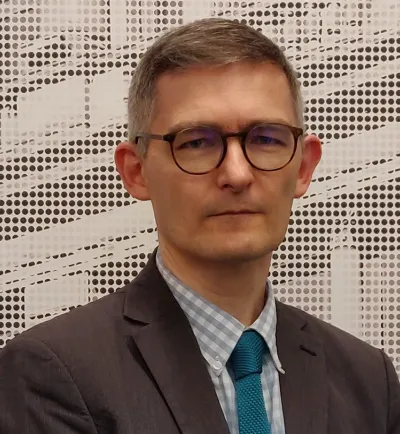A TPD2024 Blog: An Interview with Julian Moss of WSP
 In celebration of 2024’s Transport Planning Day, TPS Director of Communications, Georgia Corr, sat down with Julian Moss, Associate of WSP in the UK, to chat through his journey into transport planning and thoughts on the critical strategies that transport planners can employ to make car-free choices easier and more appealing.
In celebration of 2024’s Transport Planning Day, TPS Director of Communications, Georgia Corr, sat down with Julian Moss, Associate of WSP in the UK, to chat through his journey into transport planning and thoughts on the critical strategies that transport planners can employ to make car-free choices easier and more appealing.
Julian, can you provide a summary of your background?
I am not a typical transport planner (if there is such a thing). I studied Russian language and literature at university, then worked as a lecturer and later a university manager in quality assurance, timetabling and exams. Next, a career change: Edinburgh Napier’s Transport Planning Masters by distance learning and aged 42 I was in a graduate job, starting out on my new transport planning career. It built on all sorts of things I had been doing for years – spatial analysis and planning, scenario testing and modelling, project management – and put a new twist on it. Two and a half great years at Transport for Greater Manchester and now six and a half challenging and rewarding years at WSP – and here I am.
My cheesy one-liner on LinkedIn is that I am trying to make the world a better place, one new station, bus service improvement plan and tram line at a time, and that sums it up quite nicely. Most of my work is on public transport projects – that covers network planning, business cases, policy and strategy development and an entire range of other stuff connected to buses, trains and trams. I am geekily keen on analytics and how we assess networks for the access and freedom they give people – so collaborating with colleagues at Podaris to make a Bus Connectivity Assessment toolkit earlier in 2024 was a lot of fun. I have recently joined the Transport Planning Society (TPS) Policy Panel and the bus/rail/freight sub-panel and I am looking forward to contributing to TPS policy work.
How has the industry changed over the course of your career? Are there any areas or projects that you feel particularly proud of?
We are getting better at having a workforce which is more representative of society, but there is still some way to go. We constantly need to guard against elite projection – I need to remember that my experience as a middle class, middle aged white male with a full-time job is far from typical.
We are also getting better at thinking about the full range of people and trips that we serve. Not having travel to work data from the 2021 / 2022 Census is maybe a good thing – it stops us relying on data covering what was always a minority of trips. Two shout-outs here: my colleague Susan Leadbetter’s work on making transport safer for women is hugely important. And I found out earlier this year that my colleague Maya Mistry wrote her dissertation on travel choices made by food bank users. How often do we read about that?
I am proud to have been part of the Greater Manchester bus franchising team a few years ago and delighted to see it making a real difference on the street. And I am proud to have worked on school streets schemes in Wirral – small interventions that can make a significant difference, making it safer and more pleasant for children to walk, cycle and scoot to school.
Addressing the political landscape, what strategies do you employ to garner support from various stakeholders, including government officials, community groups, and private sector entities, to enact policies aimed at reducing car use?
This is the most difficult and perhaps most important part of our job. Change is often unwelcome for many people, and there is a lot of disinformation around some of the policies that would help us reduce car use. I play to my strengths by designing better bus networks, collaborating with clients to prioritise investments and building the business cases for more sustainable options – so that leaders and decision makers have well designed schemes to invest in. And when we make the alternatives better than using the car – cheaper or quicker or less hassle or more direct – then people make the switch.
What do you think the Government’s top three priorities should be for decarbonisation? Is it reducing car use, or are there other policies you feel that would be more impactful?
I think most transport planners could reel off quite a long list of things to do here: electrify main line and suburban railways, heavily push EVs, increase grid capacity, continue to decarbonise electricity generation, invest in active travel schemes so that walking and cycling are the natural choices for most (not all) trips for most (not all) people, change planning policy to densify cities so that people can live closer to the places they want to get to, improve buses, pursue all sorts of options for moving freight over long and short distances.
But all these things need leadership. So, priority one is making the case for change and prioritising investment to address the climate emergency.
Priority two is then to plan, implement and fund change.
And priority three is to create the space for others, including local government, the private and third sectors, to make the changes they are best placed to lead.







